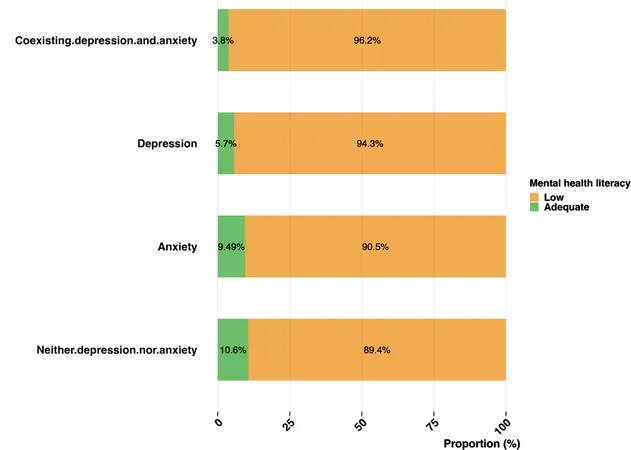
Shocking Revelation: Low Mental Health Literacy Linked to Depression and Anxiety in Over 16,000 Adults in China!
2024-10-06
Overview
Recent research reveals a startling connection between low mental health literacy and increased rates of depression and anxiety among adults in China. This comprehensive study, involving 16,715 participants, shines a light on the urgent need for enhanced understanding and education in mental health to combat widespread psychological distress.
Study Insights
The research utilized data from the Guangdong Mental Health Survey, conducted between September and December 2021. It targeted adults aged 18 and older residing in Guangdong, aiming to identify the correlation between mental health literacy—the understanding of mental health conditions and treatment—and symptoms of depression and anxiety.
Findings
The results were indeed eye-opening. Among participants, an alarming 96.2% of those exhibiting both depression and anxiety showed low mental health literacy, compared to only 89.4% of those without either condition. The analysis revealed a stark statistic: low mental health literacy was associated with nearly three times the likelihood of depression and significantly higher rates of anxiety when compared to those with adequate mental health literacy.
Implications of Low Mental Health Literacy
This study underscores that mental health literacy is not just an academic term but a powerful predictor of emotional well-being. With depressive disorders spanning approximately 37.3% of the global burden of disease and anxiety disorders at about 22.9%, it’s clear that improving mental health literacy could be a game-changing public health initiative.
Mental health literacy encompasses knowledge, attitudes, and skills regarding mental health, and is crucial for prevention and intervention. Sadly, findings indicate a concerning recognition gap surrounding mental disorders in China, with only 25.2% recognizing depression and 18.2% for anxiety.
Targeting The Issue
Enhancing mental health literacy involves more than just education; it also requires tailored community programs. Various studies suggest that integrating mental health education in schools has shown promise, but similar strategies must be adapted for adults in diverse community settings. Programs like the mhGAP-Intervention Guide employed in Kenya have demonstrated significant effectiveness and could serve as a model for initiatives in China.
Conclusions and Future Directions
The association between low mental health literacy and psychological distress emphasizes the need for more preventative measures. Strategies aimed at improving mental health literacy should be embedded within public health frameworks, targeting all adult age groups. Fostering mental health awareness can potentially reduce the alarming levels of depression and anxiety currently observed.
In summary, as the study reveals the dramatic link between mental health literacy and psychological symptoms, it’s clear we must prioritize education in mental health for a healthier future. Are we ready to take on this challenge? The well-being of millions depends on it!


 Brasil (PT)
Brasil (PT)
 Canada (EN)
Canada (EN)
 Chile (ES)
Chile (ES)
 España (ES)
España (ES)
 France (FR)
France (FR)
 Hong Kong (EN)
Hong Kong (EN)
 Italia (IT)
Italia (IT)
 日本 (JA)
日本 (JA)
 Magyarország (HU)
Magyarország (HU)
 Norge (NO)
Norge (NO)
 Polska (PL)
Polska (PL)
 Schweiz (DE)
Schweiz (DE)
 Singapore (EN)
Singapore (EN)
 Sverige (SV)
Sverige (SV)
 Suomi (FI)
Suomi (FI)
 Türkiye (TR)
Türkiye (TR)